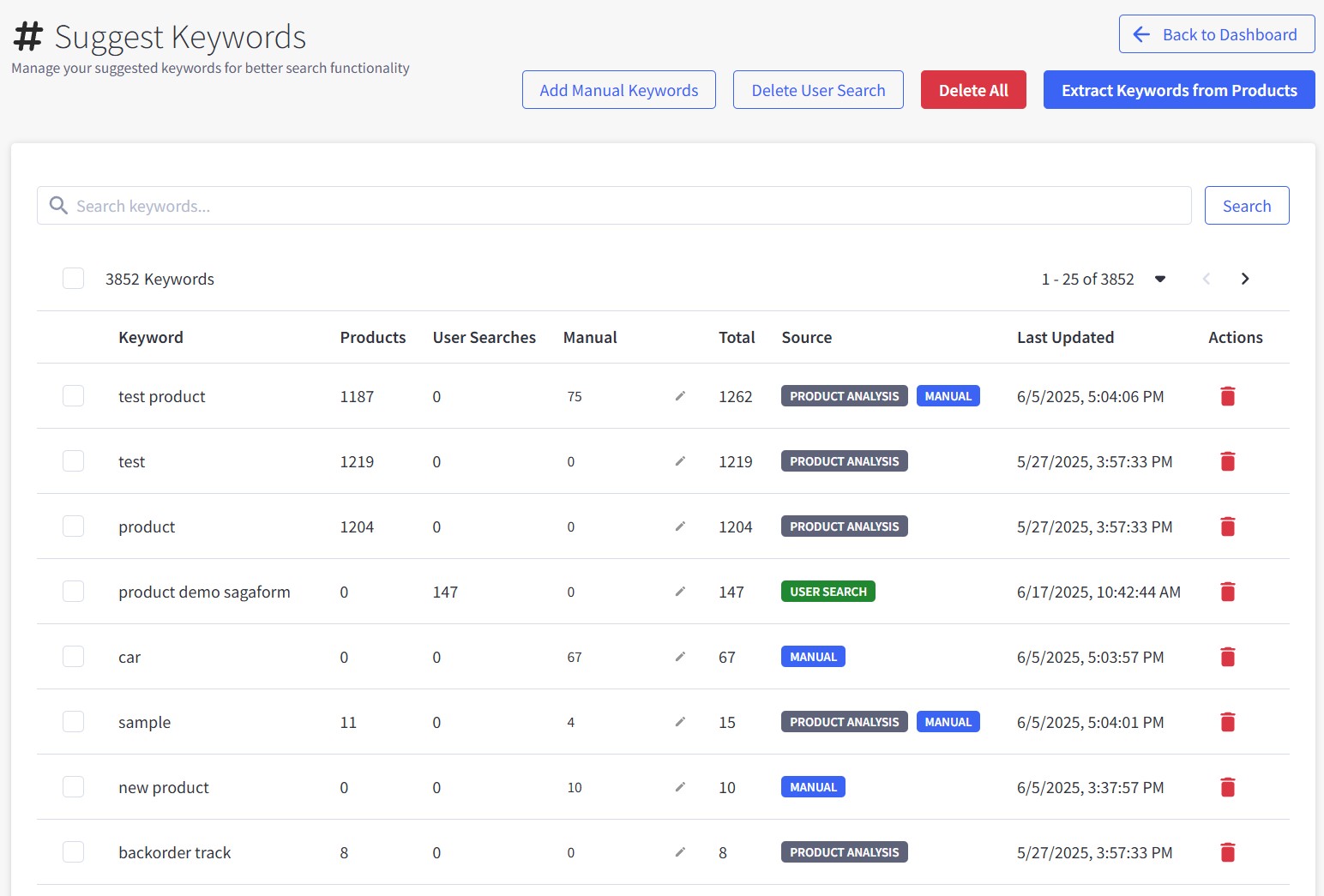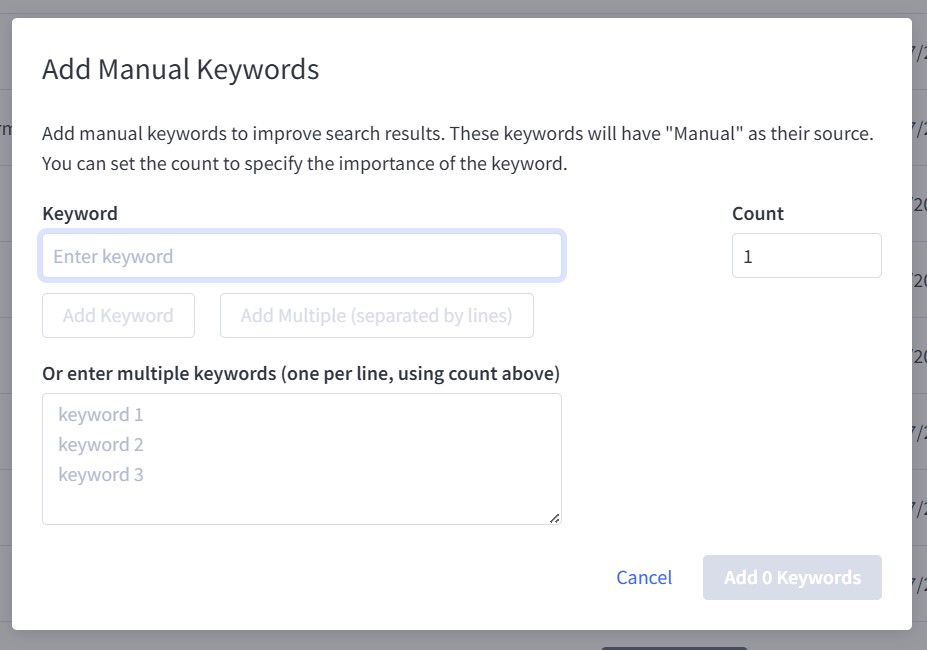Chapter 6: Keyword Management¶
Manage suggested keywords that appear when customers type in your search box to improve search experience and help customers find products faster.
Accessing Keyword Management¶
- Navigate to Dashboard → Suggest Keywords (hashtag icon)
- The page shows all your current keywords with management options

Keyword Management Interface¶
Main Action Buttons¶
Located at the top of the page:
Add Manual Keywords¶
Add specific keywords you want to promote in search suggestions.
Delete User Search¶
Delete keywords to prevent them from appearing in search suggestions.
Delete All¶
Clear all keywords.
Extract Keywords from Products¶
Automatically generate keywords from your product catalog (names, descriptions, brands, etc.).
Keyword Table Overview¶
The table displays all keywords with the following information:
Table Columns:¶
Keyword
- The actual search term customers see
Products
- Number of products that match this keyword
- Higher numbers indicate better keyword coverage
User Searches
- Number of times customers searched for this term before merging into this table
- This count does not update after the keyword is added to the table
Manual
- Used to adjust priority level of this keyword
- Click ✏️ (pencil icon) to edit manual count
Total
- Combined total from all sources
- Overall relevance score for the keyword
Source
- Shows how the keyword was created:
- PRODUCT ANALYSIS: Auto-generated from product data
- MANUAL: Added manually by you
- USER SEARCH: Merged from User Search Keywords into Suggested Keywords
Last Updated
- When the keyword was last modified
- Helps track recent changes
Actions
- 🗑️ Delete button to remove individual keywords
Adding Manual Keywords¶
- Click "Add Manual Keywords" button
- The Add Manual Keywords dialog appears with options:

Single Keyword Method:¶
- Enter keyword in the Keyword field
- Set Count value to specify importance (default: 1, higher = more important)
- Click "Add Keyword" or "Add Multiple (separated by lines)"
Multiple Keywords Method:¶
- Use the text area: "Or enter multiple keywords (one per line, using count above)"
- Enter one keyword per line
- All keywords will use the same Count value set above
- Example format:
Count/Importance Setting:¶
- Count: Determines keyword priority in search suggestions
-
Higher count: Keyword appears higher in search suggestions
-
Click "Add 0 Keywords" button to save (number updates based on keywords entered)
Examples of good manual keywords:
- Brand names: "apple", "samsung", "nike"
- Product categories: "wireless headphones", "running shoes"
- Seasonal terms: "christmas gifts", "back to school"
Extract Keywords from Products¶
Use this feature to automatically generate keywords from your existing products:
- Click "Extract Keywords from Products" button
- The system analyzes your product catalog
- Keywords are extracted from:
- Product names
- Product descriptions
- Brand names
- Category names
- Custom fields
Benefits:
- Saves time on manual keyword entry
- Ensures keywords match your actual products
- Captures product terminology customers use
- Updates automatically when you add new products
Managing Existing Keywords¶
Search and Filter¶
- Use the search box to find specific keywords
- Filter by keyword type or source
- Sort by any column (Products, User Searches, Total, etc.)
Bulk Operations¶
- Select multiple keywords using checkboxes
- Use bulk actions to delete multiple keywords at once
- Monitor the total count (e.g., "3852 Keywords" in the example)
Individual Keyword Management¶
- Edit Manual Count: Click the ✏️ icon in the Manual column
- Delete Single Keyword: Click the 🗑️ icon in Actions column
- View Details: Click on any keyword to see more information
Keyword Sources Explained¶
PRODUCT ANALYSIS¶
Keywords automatically extracted from your product data:
- High reliability since they match actual products
- Updates when you add/modify products
- Usually highest "Products" count
MANUAL¶
Keywords you've added specifically:
- Strategic keywords for important searches
- Brand names or category terms
- Seasonal or promotional keywords
USER SEARCH¶
Keywords from actual customer searches:
- Shows real customer demand
- High "User Searches" count indicates popular terms
- Valuable for understanding customer language
Best Practices¶
Adding Manual Keywords:¶
- Use strategic terms: Add brand names, product categories, and seasonal keywords
- Set appropriate count: Use higher count (5-10) for important keywords
- Customer language: Use terms customers naturally search for
- Avoid duplicates: Check existing keywords before adding new ones
Managing Keyword Sources:¶
- PRODUCT ANALYSIS: Let system auto-extract from your catalog regularly
- MANUAL: Add strategic keywords you want to promote
- USER SEARCH: Review and merge valuable customer search terms
Quality Control:¶
- Monitor "Products" column: Remove keywords with zero matching products
- Check "User Searches": Focus on keywords with actual customer demand
- Use "Delete User Search": Remove irrelevant or poor quality search terms
- Balance keyword count: Don't add too many keywords that dilute search quality
Maintenance Schedule:¶
- Weekly: Review User Search Keywords page and merge valuable terms
- Monthly: Run "Extract Keywords from Products" for new items
- Quarterly: Clean up keywords with zero products or low performance
- Seasonally: Add seasonal terms before peak periods, remove after
Troubleshooting¶
Keywords Not Appearing in Search Suggestions¶
- Check if keyword exists in the table
- Verify "Products" count is greater than 0
- Ensure you have products that match the keyword
- Clear cache if recently added
No Keywords Being Generated¶
- Verify your products have descriptions and titles
- Run "Extract Keywords from Products"
- Check if products are properly indexed
- Contact support if extraction fails
Too Many Irrelevant Keywords¶
- Use "Delete User Search" to remove poor quality searches
- Focus on keywords with good "Products" to "User Searches" ratio
- Regularly clean up low-performing keywords
Next Steps: After optimizing your keywords, move on to Chapter 7: User Search Analytics to track how customers search in your store.
Need help with keyword strategy? Contact our support team for personalized recommendations.